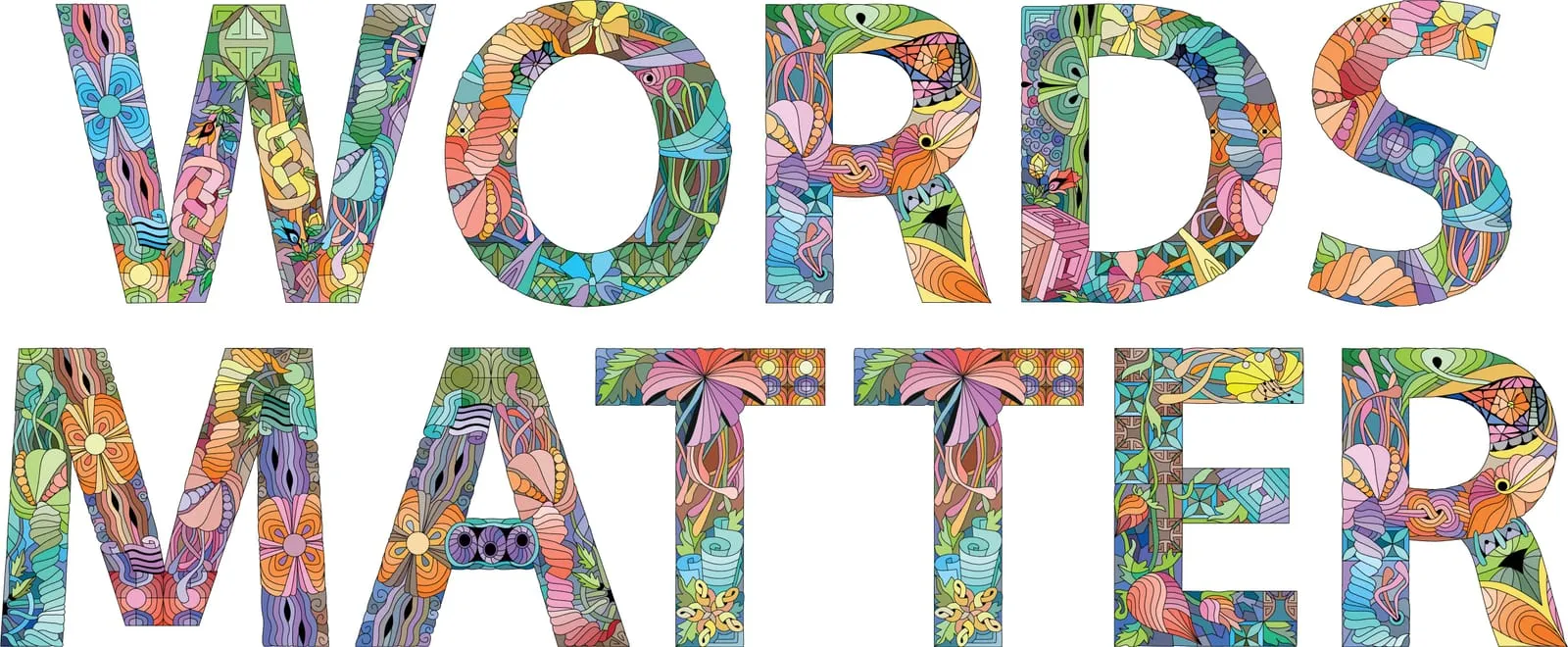Our Words Mold Our Reality
By Denise Blanc, MA, ACC

OMG – When I was driving here, the traffic was living hell. I mean it was really a
nightmare. It felt like I was going completely insane!
What kind of reality do we create with these messages? Rarely do we even stop to interrogate our words and ask ourselves if they are really true? Are you seriously going crazy because of traffic? Probably not. And are you really losing your mind? Highly unlikely. What messages do you think these statements might be sending to your emotional body?
Because our bodies respond.
Studies in neuroscience, cognitive behavioral therapy, and emotional intelligence tell us that our thoughts affect our feelings – and our actions. When we use catastrophizing language, we create an accompanying physical and emotional response. Our bodies really don’t know the difference between our words, thoughts, and an actual event. We can think of our favorite meal, and we start to salivate, we remember a sad event and we might tear up, or we think stressful thoughts and our body responds by creating stress hormones.
Our words (and other people’s words) have a direct effect on our brain activity and our bodily systems. Whether we intend that effect or not, it’s just how we’re wired.
We are a social species.
And as a social species, we naturally synchronize with the emotions of others around us. We may think that the information we share with each other is simply transactional, but we are often co-regulating each other’s emotions. Our emotions are social and can have consequences for other people.
We see this in a leader who is able to stay calm even in the midst of a crisis and thereby allows her entire team to do the same, or the way we react to a driver who is tailgating us, and then pulls up beside us and screams in our face. Either way we are affected. Our words, thoughts, and actions have consequences.
Best-selling Author Robin Sharma, wrote, “Our mind is a wonderful servant but a terrible master.” What he meant is that left unchecked we will unconsciously respond to the endless chitter chatter of our thoughts. – Without being in control of our thinking we obediently follow wherever our mind leads us dictating thoughts which often produce
stress and fear.
I’ve been reflecting on the fact that for many years I would describe myself as a “recovering drama queen.” In the past, I have been prone to exaggeration, hyperbole
and in my early years – catastrophizing. I have come to understand how my language creates unnecessary stress for myself – and can also affect those around me.
Although drama is essential for good storytelling (and I pride myself on being a good storyteller) there is a wide difference between lively and engaging stories versus catastrophizing and negativity. As a storyteller, I have become increasingly aware of how my sometimes-dramatic language creates unnecessary stress for myself – and others.
When using catastrophic language, we activate the lower part of our brain which spews a hormone called cortisol. Cortisol blocks the part of our brain that produces our wisdom and insight, in our pre-frontal cortex – and we need our pre-frontal cortex for clarity, sanity, and creative problem solving.
If we wish to become the master of our minds, we can begin by regulating our nervous system and start to choose our words wisely. With subtle shifts of attention and simple practices, we begin to build a new relationship with our mind and our language. We can become the master of our stories and choose how we wish to tell them.
Three simple strategies to make the shift
- Interrupt the drama and stress cycle by incorporating simple Mindfulness
practices. This can be as simple as taking a Pause with three conscious deep breaths whenever you notice yourself becoming activated. As you inhale, feel your lungs and chest expand as you say to yourself “inhale,” and then as you exhale, feel your lungs and chest contract, and say to yourself, “exhale.” With just three deep breaths we are self-regulating our nervous system, our ability to control our behavior, emotions, and thoughts in the pursuit of how we wish to respond. - Watch your words. However, satisfying it may be to use dramatic language, when we can substitute neutral and factual language, our nervous system settles down. Instead of the “traffic is a nightmare, and I am going insane,” reframe with “it looks like a major accident ahead, things are really backed up. It is out of my control, I will call work and let them know and put on some good music.”
- Understand that we can choose to be different. Think of someone in your life who models calm and centered presence – and realize that you too, can be that person. Wherever, we put our attention, our energy will follow. Decide you want to model calm and visualize that image (create a mental movie). The more you make this shift, the easier and quicker the behavior becomes, – until it is automatic.
We have the power to choose how we think about things and the words we use. We literally are molding our world with each of our word choices. Personally, I am less interested in becoming caught in drama. And so much more interested in choosing my response, knowing that my words matter – both to me and to those around me.
I won’t stop being a storyteller with dramatic flair. I like that about myself – what I don’t like is holding a negative focus, catastrophizing, or demonizing others. I know how contagious my behavior can be as this quote from the late Vietnamese Zen master Thich Nhat Hanh epitomizes. He said, “when the crowded Vietnamese refugee boats came and were met with pirates and storms, if even one person was able to remain calm and centered, it became enough for everyone to survive.”
We can each become that person.
Whether you are new to Toastmasters or a Seasoned Toastmaster, you are always welcome as our guest at Heart2Heart Toastmasters Meetings.
Our club meetings are the third Thursday of every month on Zoom from 6-7 pm PT and the first Saturday of the month is our Hybrid Meeting on Zoom and in person at Elegance at 2100 San Pablo Avenue, Berkeley, California from 3:30 PM to 6 PM PT.
Register here for the Saturday meeting https://bit.ly/H2HSaturdayMeeting
Register here for the Thursday meeting: https://bit.ly/H2HThursday
You are always welcome as our guest! We hope to see you soon!
Denise Blanc, MA, ACC is a Certified Emotional Intelligence Coach, Mediator, and Senior Organization Development Consultant. An expert in communication, she coaches, speaks, teaches, and writes at the intersection of Emotional Intelligence, Conflict Transformation, and Mindfulness. Her noble goal is to inspire candor, courage, and compassionate communication to create a more just and caring world.
Denise is the founder of River Logic Partners, a leadership coaching and consulting firm. She has been the chief architect of numerous leadership academies over her career, winning multiple awards for her leadership design, e.g. The International Spirit a Work Award, "Best Practices for Creating New Leaders."; She has over two decades as a student and teacher of mindfulness, and currently teaches programs for Shambhala, a global Buddhist organization, in areas of social justice and race.
Denise is the author of RiverLogic: Tools to Transform Resistance and Create Flow in all of our Relationships. Whenever possible, Denise is hiking the hills and swimming in natural bodies of water around the world.
